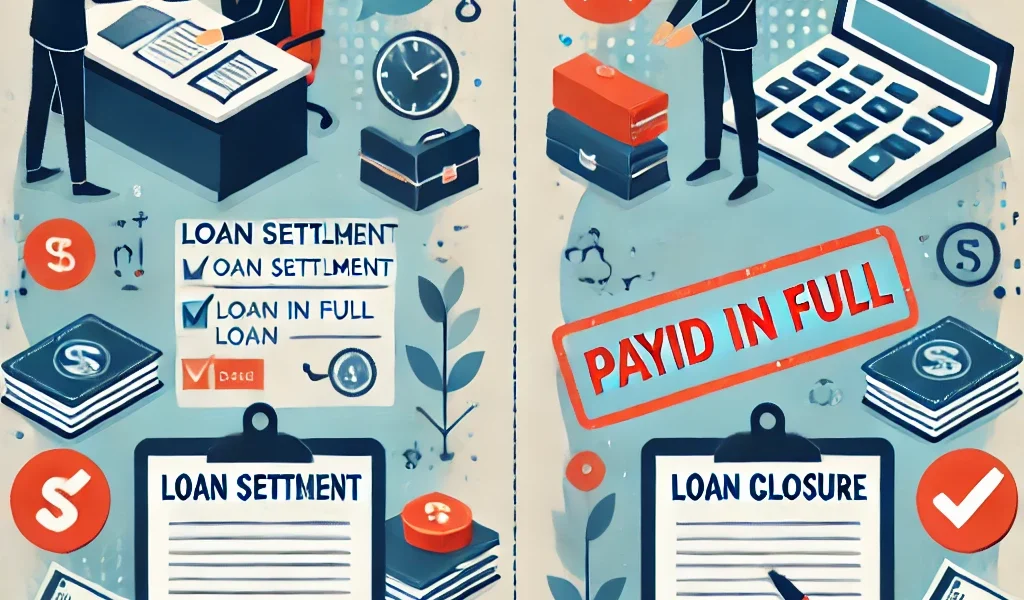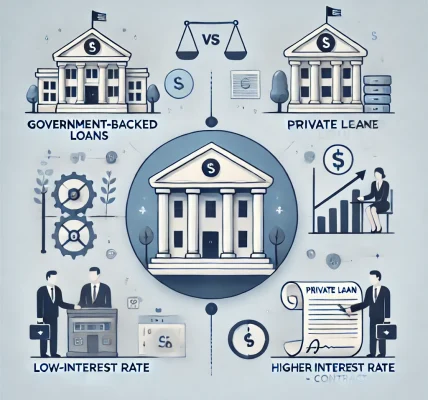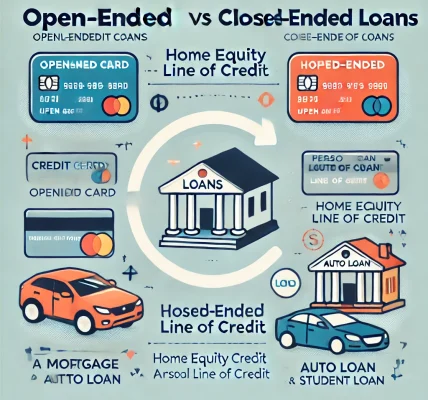Introduction
Loans are an integral part of modern financial planning, whether for personal needs, home purchases, business expansion, or education. However, at some point, borrowers must bring their loans to a close. Two common ways to do this are loan settlement and loan closure. While they may sound similar, they are very different in terms of financial consequences, credit score impact, and long-term implications.
Understanding these differences is crucial for borrowers who want to manage their finances wisely. In this article, we’ll explore:
- What loan settlement and loan closure mean
- Key differences in policies
- Pros and cons of each option
- Their impact on credit scores
- Legal aspects and borrower rights
By the end, you’ll be equipped with the knowledge to make an informed decision about handling your loan repayment.
What is Loan Settlement?
Loan settlement is a process where the borrower negotiates with the lender to pay off a part of the outstanding loan amount instead of repaying it in full. It typically happens when a borrower is facing financial difficulties and cannot make full payments.
How Loan Settlement Works:
- Borrower requests settlement – When a borrower is unable to repay, they approach the bank/NBFC to negotiate.
- Bank offers a reduced amount – The lender may agree to settle for a lump sum amount, usually lower than the total outstanding balance.
- Settlement Agreement – Once agreed, a formal settlement letter is issued.
- Loan Status: ‘Settled’ Not ‘Closed’ – The loan account is marked as ‘settled’ in the credit report, which negatively impacts the borrower’s credit score.
Pros of Loan Settlement
✅ Immediate relief from repayment burden
✅ Helps avoid legal action and prolonged debt recovery processes
✅ A faster way to clear a loan when funds are tight
Cons of Loan Settlement
❌ Adversely affects credit score (marked as ‘Settled’ instead of ‘Closed’)
❌ Reduces future loan approval chances
❌ May involve legal negotiations and settlement fees
❌ Lenders may deny future loans due to poor credit history
What is Loan Closure?
Loan closure, also known as full repayment or foreclosure, occurs when the borrower completely repays the loan, including principal and interest, without any reduction in the outstanding amount.
Types of Loan Closure:
- Regular Closure – The borrower repays all EMIs on time till the loan tenure ends.
- Prepayment or Foreclosure – The borrower repays the remaining loan amount before the due date to close the loan early.
- Voluntary Loan Closure – Some borrowers choose to close a loan early by making a lump sum payment.
Steps to Close a Loan:
- Pay the outstanding principal and interest.
- Obtain a No Objection Certificate (NOC) from the lender.
- Ensure the loan account is marked as ‘Closed’ in credit reports.
- Collect all necessary documents related to the loan.
Pros of Loan Closure
✅ Improves credit score (marked as ‘Closed’ in credit report)
✅ No legal or financial complications
✅ Saves on long-term interest payments (if foreclosed early)
✅ Better financial credibility for future loans
Cons of Loan Closure
❌ May involve foreclosure charges in some cases
❌ Requires financial planning to arrange full repayment
Loan Settlement vs. Loan Closure: Key Differences
| Feature | Loan Settlement | Loan Closure |
|---|---|---|
| Definition | Negotiated repayment of a lower amount than owed | Full repayment of loan amount |
| Impact on Credit Score | Negative (Marked as ‘Settled’) | Positive (Marked as ‘Closed’) |
| Future Loan Eligibility | Reduced chances of approval | Increases future loan eligibility |
| Legal Risks | Possible disputes and settlement agreement issues | No legal risks |
| Financial Burden | Lower repayment amount | Full repayment may require large funds |
How Loan Settlement and Loan Closure Impact Credit Scores
- Loan Settlement: A settled loan indicates that the borrower failed to repay the full amount, negatively impacting the CIBIL score. It may take years to rebuild creditworthiness.
- Loan Closure: A closed loan means the borrower fulfilled their obligation, which boosts the credit score and increases credibility with lenders.
Credit Report Impact (Example)
| Loan Status | CIBIL Score Impact |
|---|---|
| Settled | Decreases by 50-100 points |
| Closed | Increases by 20-50 points |
Lenders prefer to approve loans for borrowers with a history of loan closure rather than settlement.
Legal Aspects and Borrower Rights
- Loan Settlement is NOT a Right: Banks are not obligated to offer settlement; it is only an option when recovery seems difficult.
- Settlement Letter is Crucial: Always get a written settlement agreement to avoid future disputes.
- Loan Closure Should be Documented: Obtain an NOC and ensure your credit report reflects ‘Closed’ status to avoid issues.
- Disputing Incorrect Loan Status: If a fully repaid loan is marked as ‘Settled’, borrowers can raise a dispute with CIBIL, Experian, or Equifax to correct it.
Which Option Should You Choose?
- If possible, always opt for Loan Closure as it maintains financial credibility.
- Choose Loan Settlement only if repaying the full amount is impossible and you have no other financial options.
- Consider alternatives like loan refinancing, debt restructuring, or emergency funds before settling.
Conclusion
Understanding the policies regarding loan settlement and loan closure is crucial for making an informed decision. While settlement can offer short-term relief, it comes at the cost of a damaged credit history. On the other hand, loan closure ensures financial stability and credibility in the long run.
If you are facing financial difficulties, consider speaking to your lender about restructuring options rather than opting for settlement. Proper financial planning and responsible borrowing can help you maintain a healthy credit score and avoid potential loan-related legal troubles.




